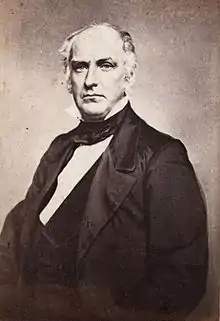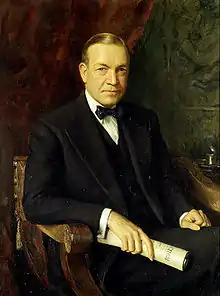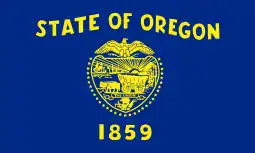Oregon Republican Party
The Oregon Republican Party is the state affiliate of the United States Republican Party in Oregon, headquartered in Salem. The party was established in the Oregon Territory in February 1857 as the "Free State Republican Party of Oregon" and held its first state convention on April 1, 1859, after Oregon achieved statehood.
Oregon Republican Party | |
|---|---|
 | |
| Chairperson | Bill Currier[1] |
| Founded | 1857 |
| Headquarters | 752 Hawthorne Ave NE, Salem, OR 97301 |
| Ideology | Conservatism Fiscal conservatism Social conservatism Trumpism[2][3] |
| Political position | Right-wing |
| National affiliation | Republican Party |
| Colors | Red |
| U.S. Senate delegation | 0 / 2 |
| U.S. House delegation | 1 / 5 |
| Statewide offices | 0 / 5 |
| Oregon Senate | 12 / 30 |
| Oregon House | 22 / 60 |
| Website | |
| oregon | |
The Republican Party was the dominant political organization in the state of Oregon from the time of the American Civil War through the 1960s, before moving to a position of approximate parity with the rival Democratic Party of Oregon for the next four decades. In the 21st century, the Oregon Republican Party has become a minority party in state government, which has generally been controlled by Democrats. The Oregon Republican Party's current platform is Right-wing.
The Oregon Republican Party gained national attention in June 2019 when all 11 Republican state senators staged a "walkout" designed to prevent a vote on Oregon House Bill 2020. The walkout deepened the alignment of the party with right-wing militias, including Oregon 3 Percenters and Oath Keepers as well as pro-Trump social media.[4][5] State Senator Brian Boquist threatened, in response to the state government's efforts to return him to the state capitol in Salem, "Send bachelors and come heavily armed."[6][7][8][9] According to the Pew Charitable Trusts, "rare walkouts are ones like that in Oregon, where lawmakers flee the state for several weeks or months. These large events use a lot of political capital and show voters that those lawmakers might be sore losers and unwilling to negotiate."[10]
History
Antislavery origins
The politics of the Oregon Territory were largely dominated by the generally states' rights Democratic Party with a vocal pro-slavery component. Only weak opposition came from the Whigs and their nativist Know Nothing cousins.[11] A serious opposition first began to emerge in the aftermath of the bitter and costly Rogue River Wars of 1855 to 1856, centered around the growing anti-slavery sentiment nationally and increasing threat that the Democratic Party would hasten the expansion of slavery in Oregon. Opposition to the Democrats gradually coalesced around the fledgling Republican Party that was intent upon slavery's limitation.[11][12]
A first convention of Republicans in Oregon was held in May 1856 at the Lindley schoolhouse in Jackson County, with the gathering called for the nomination of candidates to appear on the June 1856 territorial ballot.[11] The convention also adopted a resolution declaring that while Congress had no power over the existence of slavery in states in which it already existed, outside of such state jurisdictions federal power should be exerted to prevent its introduction.[13]
Throughout 1856, antislavery sentiment continued to grow in Oregon, with Republican clubs springing up around the state.[14] Republican county conventions were held in Clackamas, Washington, Marion, Linn, and possibly one or two other locales around the state.[15] Representatives of these county gatherings were then assembled at a territorial organizing convention held in Albany on February 11, 1857, which adopted the official name "Free State Republican Party of Oregon" for the organization.[16] A platform for the new political party was announced, emphasizing the indissoluble nature of the United States, opposition of the expansion of slavery to free territory, prohibition of polygamy, construction of a Pacific railroad to link Oregon with California, government effort to improve the navigability of rivers and harbors, and admission of Oregon to the United States only as a free state.[16]
The year 1857 was marked by preparations for future Oregon statehood, including the holding of a constitutional convention, and the ruling Democratic Party found itself divided over the question of slavery, attempting to sidestep the issue by passing in state convention a resolution binding Democratic delegates to such a gathering to the position that the matter of slavery in Oregon be settled later by a vote of the people.[17]
The Republicans did not nominate a candidate for Representative to Congress in the June 1857 election, instead pooling their support for G.W. Lawson, a Free Soil Democrat running as an independent.[18] While pro-slavery Democrat Joseph Lane was ultimately sent as the Territorial delegate to Congress, voting further down the ticket showed a Republican advance, with Republicans joining with so-called "soft" (free state) Democrats[19] to elect about a third of the delegates to the constitutional convention and 10 of the 30 members to the Oregon Territorial Legislature.[20]
The constitutional convention held in the summer of 1857 ultimately steamrolled Republican sentiment and again sidestepped the slavery question by deciding to leave the slavery question to a vote of the people, while declaring that "no negro, Chinaman, or mulatto should have the right to vote."[21] The bill of rights adopted by the Democratic-dominated constitutional convention gave the future state legislature the right to exclude African-Americans from immigrating to the state altogether, thereby setting the stage for restrictive racial laws in spite of Oregon's free state status.[22]
Three propositions were ultimately put to territorial voters, with the Democratic-authored Oregon Constitution gaining approval by a vote of about 7,200 to 3,100, a measure allowing slavery falling to defeat by a majority of nearly 5,100 votes, and a proposal allowing "Free Negroes" to settle in Oregon overwhelmingly defeated by a vote of 8,640 to 1,081.[23] Oregon would not be a slave state but rather one closed to black immigration — a law remaining on the books (albeit not in actual effect) into the 20th Century.[24]
Civil War years

On April 1, 1859, just two weeks after Oregon was admitted to the Union, the Republican Party held a convention in Salem at which it nominated David Logan as the party's choice for the state's first fully fledged Congressional representative.[25] Logan would narrowly fall to defeat both in 1859 and again when nominated again for a full term in the election of 1860, but national political events would soon change the tide for the new political party.[25] The Democratic Party found itself divided with the coming of the American Civil War between pro- and anti-Union elements.[26] With the nation embroiled in war, pro-Union Democrats and Republicans put aside their differences at a fusion convention in April 1862, establishing themselves as the Union Party.[26] This joint political organization would continue in Oregon through four elections under the Union Party banner, terminating only in 1868.[26]
As the united political organization for a preserved United States of America in contradistinction to defeatists and Confederate sympathizers, the Union Party and, after 1868, the rechristened Republican Party experienced dramatic political gains in Oregon, buoyed by the defection and disenfranchisement of the Democratic South. The party, as one historian noted, began to "grow like the plant that sprang up from the mustard seed."[25] An alliance of Republicans and pro-Union Democrats in the Oregon State Legislature came together in 1860 to elect Edward Dickinson Baker as the first Republican U.S. Senator from Oregon.[27] An era of Republican dominance in Oregon was begun.
When the Civil War began in 1861, Baker raised his own militia, in which he served as commanding officer. On October 21, 1861, with Congress out of session, Colonel Baker and his men met Confederate forces on a hill called Ball's Bluff just outside Washington, D.C. Shortly after the battle started Baker was killed along with nearly 1,000 others.[28]
Despite the untimely death of Oregon's first Senator, E.D. Baker would hardly be the last. Over the next 30 years a steady stream of Republicans were sent to the U.S. Senate by the Oregon legislature, including Benjamin F. Harding (1862), George H. Williams (1864), Henry W. Corbett (1866), John H. Mitchell (1872, reappointed 1885, re-elected 1887 and 1891), Joseph N. Dolph (1882, re-elected 1889), and George W. McBride (1895).[29]
Realignment

By the 1890s, the ideology of the two major parties had begun to switch, with the Republican Party emerging as the party of sound money, industry and commerce, protective tariffs, and expansionist foreign policy.

Platform

The party's formal platform, adopted in 2015, expresses opposition to abortion and assisted suicide; support for mandatory minimum sentencing for violent offenders, truth-in-sentencing laws, and the death penalty; lower taxes; deregulation and minimal government intervention in the economy; opposition to same-sex marriage; repeal of the Patient Protection and Affordable Care Act; opposition for "amnesty" for undocumented immigrants; an individual right to keep and bear arms; and voter ID laws.[30]. The party's platform, amended in 2019, includes opposition to National Popular Vote Interstate Compact, advocacy of the arming of educational staff "to protect themselves and their students from violence" while opposing gun-free zones; asserting that "marriage is between one man and one woman" and that "there are only two sexes, male and female, based on a person’s biological sex at birth"; favoring that "all government business shall be conducted in English"; continuing repeal of Obamacare; asserting that "violent, radical, Islamic Jihadists and other groups have . . . declared war on America"; and "need for personal responsibility and self-reliance in the event of a disaster."[31]
On 19 January 2021 the party issued a resolution declaring that the 2021 storming of the United States Capitol by supporters of Donald Trump was a "false flag" event meant to "discredit President Trump, his supporters, and all conservative Republicans." Others had previously claimed antifa had staged the attack, though the FBI stated there was no evidence of antifa involvement.[32][33][34]
The 19 January 2021 party resolution provoked substantial controversy. Oregon House Republicans pointedly disavowed the party resolution, while Senator Tim Knopp (Republican of Bend) stated publicly that he did "not support the Oregon Republican Party’s resolution."[35][36][37] Knute Buehler, a former Oregon House member and recent Republican gubernatorial nominee, "filed to change his registration from Republican to independent."[38] More than 6,000 Republicans left the party in January 2021.[39] In early February, state voter registration indicate a total of 11,000 registered Republicans in Oregon have left the party since Election Day.[40][41]
Past elections
Party leaders

Chairman: Bill Currier
Vice Chairman: Tracy Honl
Secretary: Becky Mitts
Treasurer: John Lee
National Committeeman: Solomon Yue, Jr.
National Committeewoman: Chris Barreto
Current elected officials
Members of Congress
The Oregon Republican Party holds one of the state's five U.S. House seats and neither of the two U.S. Senate seats.
U.S. House of Representatives
Statewide offices
Republicans hold none of the five statewide offices.
State Legislators
The Oregon Republican Party holds a minority 25 of 60 seats in the Oregon House of Representatives and a minority 12 of the 30 Oregon Senate seats.
State SenateSenate Minority Leader: Herman Baertschiger, 2nd District
|
State HouseHouse Minority Leader: Carl Wilson, 3rd District
|
Conventions
| Convention | Location | Date | Notes and references |
|---|---|---|---|
| First Oregon Republican Convention | Albany | Feb. 11, 1857 | Attended by 24 delegates from 8 counties. Adopted platform, elected territorial executive committee.[44] |
| 1858 Republican Territorial Convention | Salem | April 2, 1858 | Nominated slate for national and state offices.[45] |
| 1859 National Republican State Convention | Salem | April 1, 1859 | Attended by 52 delegates from 14 counties. Nominated candidate for Congress.[46] |
| 1860 Republican State Convention | Eugene City | April 19, 1860 | Attended by delegates from 17 counties. Nominated candidate for Congress and elected 3 member State Central Committee.[47] |
| 1862 Union State Convention | Eugene City | April 9, 1862 | Attended by delegates from 18 counties. Fusion gathering of Republicans and Pro-Union Democrats. Nominated candidate for Congress, Presidential electors, and slate for statewide offices. Elected Central Committee.[48] |
| 1864 Union State Convention | Albany | March 30, 1864 | Attended by delegates from 17 counties. Nominated candidate for Congress and Presidential electors. Elected delegates to Republican National Convention.[49] |
| 1866 Union State Convention | Corvallis | March 29, 1866 | Attended by delegates from 20 counties. Nominated candidate for Congress and elected State Central Committee.[50] |
| 1868 Union State Convention | Salem | March 24, 1868 | Attended by delegates from 22 counties. Nominated candidate for Congress and Presidential electors. Elected State Central Committee and elected delegates to National Convention.[51] |
| 1870 Republican State Convention | Portland | April 7, 1870 | Attended by delegates from 22 counties. Nominated candidate for Congress and slate for state offices. Elected State Central Committee.[52] |
| 1872 Republican State Convention | Portland | March 20, 1872 | Attended by delegates from 21 counties. Nominated candidate for Congress and Presidential electors. Elected State Central Committee and delegates to National Convention.[53] |
| 1874 Republican State Convention | Salem | April 8, 1874 | Attended by delegates from 22 counties. Nominated candidate for Congress and full state ticket. Elected State Central Committee.[54] |
| 1876 Republican State Convention | Portland | May 3, 1876 | Attended by delegates from 21 counties. Nominated candidate for Congress and Presidential electors. Elected State Central Committee and delegates to National Convention.[55] |
| 1878 Republican State Convention | Salem | April 17, 1878 | Attended by delegates from 23 counties. Nominated candidate for Congress and Presidential electors. Elected State Central Committee and delegates to National Convention.[56] |
See also
Footnotes
- "Party Chairman, Bill Currier". Oregon Republican Party. Retrieved April 16, 2015.
- Oregonian/OregonLive, Ted Sickinger| The (January 20, 2021). "Oregon Republican Party condemns impeachment, aligns itself with conspiracy theories". oregonlive.
- Jaclyn Peiser, "Oregon Republican Party falsely calls U.S. Capitol riot a ‘false flag’ meant to ‘discredit President Trump’," Washington Post Jan. 26, 2021 at https://www.washingtonpost.com/nation/2021/01/26/oregon-republican-false-flag-capitol/
- Doug Brown, "Multnomah County Republicans Formally Allow Militia Groups to Run Security," Portland Mercury June 30, 2017 at https://www.portlandmercury.com/blogtown/2017/06/30/19130461/multnomah-county-republicans-formally-allow-militia-groups-to-run-security
- Jason Wilson, "Portland Republicans to use militia for security as far-right rallies continue," The Guardian 1 July 2017 at https://www.theguardian.com/us-news/2017/jul/01/portland-far-right-rally-republicans-militia-security
- Connor Radnovich, "Senate GOP threatens walkout, Gov. Brown responds with threat of state police," (Statesman Journal) USA Today 20 June 2019 at https://www.usatoday.com/story/news/2019/06/19/senate-gop-threatens-walkout-brown-responds-state-police-threat-oregon/1502876001/
- Benjamin Fearnow, "Oregon Republicans Gloat on Fox News While Hiding in Idaho to Escape Climate Change Vote," Newsweek 25 June 2019 at https://www.newsweek.com/oregon-republicans-flee-idaho-fox-news-climate-change-bill-gloat-1445731
- Julie Turkewitz, "Oregon Climate Walkout Left Republicans in Hiding, Statehouse in Disarray," New York Times June 28, 2019 at https://www.nytimes.com/2019/06/28/us/oregon-climate-fight.html
- Dirk VanderHart, "After Republican Protest, Oregon's Climate Plan Dies," NPR June 25, 2019 at https://www.npr.org/2019/06/25/735792788/after-republican-protest-oregons-climate-plan-dies
- Matt Vasilogambros, "Oregon Walkout Reflects a Growing Trend: Here's Why Lawmakers Leave," Pew Charitable Trusts Stateline June 27, 2019 at https://www.pewtrusts.org/en/research-and-analysis/blogs/stateline/2019/06/27/oregon-walkout-reflects-a-growing-trend-heres-why-lawmakers-leave
- Hubert Howe Bancroft, History of Oregon: Volume 2: 1848-1883. San Francisco, CA: The History Company, 1888.
- Jim M. Labbe, "The Colored Brothers Few Defenders: Oregon Abolitionists and Their Followers" Oregon Historical Quarterly, Winter 2019, pages 440-467, https://www.jstor.org/stable/10.5403/oregonhistq.120.4.0440
- Oregon Argus [Oregon City], June 7, 1856; cited in Bancroft, History of Oregon: Vol. 2, pg. 416, fn. 6.
- Bancroft, History of Oregon: Vol. 2, pp. 417-418.
- See: Republican League Register, a Record of the Republican Party in the State of Oregon. Portland, OR: Register Publishing Co., 1896; pg. 24.
- Bancroft, History of Oregon: Vol. 2, pg. 418.
- Bancroft, History of Oregon: Vol. 2, pp. 419-420.
- Bancroft, History of Oregon: Vol. 2, pg. 420.
- The name was a pejorative assigned to dissidents by the pro-slavery majority faction of the Democratic Party. See: Republican League Register, pg. 25.
- Bancroft, History of Oregon: Vol. 2, pg. 421. Only one of these was elected on a straight Republican ticket, however, that being John R. McBride of Yamhill County. See: Republican League Register, pg. 23.
- Bancroft, History of Oregon: Vol. 2, pg. 424.
- Bancroft, History of Oregon: Vol. 2, pp. 424-425.
- Republican League Register, pg. 25.
- Oregon's Black Exclusion Law was only repealed by voters in 1926. See: Greg Nokes, "Black Exclusion Laws in Oregon," Oregon Encyclopedia, Oregon Historical Society.
- Republican League Register, pg. 27.
- Republican League Register, pg. 28.
- Republican League Register, pp. 27-28.
- "U.S. Senate: Senator Killed in Battle". www.senate.gov.
- Republican League Register, pg. 54.
- "Oregon Republican Party Platform, 2015". Retrieved 14 June 2016.
- Oregon Republican Party 2019 Platform as Amended August 24th, 2019 at https://hinessight.blogs.com/files/oregon-republican-party-platform.pdf
- Peiser, Jaclyn. "Oregon Republican Party falsely calls U.S. Capitol riot a 'false flag' meant to 'discredit President Trump'" – via www.washingtonpost.com.
- Alba, Davey (January 8, 2021). "F.B.I. says there is no evidence antifa participated in storming the Capitol" – via NYTimes.com.
- "PolitiFact - No, the FBI didn't confirm antifa activists breached the Capitol". @politifact.
- Ryan Haas and Dirk VanderHart, "Oregon House Republicans Disavow Their Party’s Position On Capitol Attack," 28 January 2021 at https://www.ijpr.org/politics-government/2021-01-28/oregon-house-republicans-disavow-their-partys-position-on-capitol-attack
- "Oregon House Republicans, Sen. Knopp take issue with state GOP’s ‘false flag’ claims" Salem, Oregon (KTVZ) 27 January 2021 at https://ktvz.com/news/government-politics/2021/01/27/oregon-house-republicans-sen-knopp-take-issue-with-state-gops-false-flag-claims/
- Dirk VanderHart and Lauren Dake, "Oregon’s GOP party and House Republicans, divided," Jan. 29, 2021 at https://www.opb.org/article/2021/01/30/oregon-politics-republican-party-gop-house/
- Annie Karni and Mike Baker, "An Emboldened Extremist Wing Flexes Its Power in a Leaderless G.O.P.," New York Times (1 Feb 2021) at https://www.nytimes.com/2021/02/01/us/politics/republicans-trump-ronna-mcdaniel.html
- John Tierney, "More than 6,000 Oregonians left the Republican Party in January," KGW.com (February 2, 2021) at https://www.kgw.com/article/news/politics/thousands-of-republicans-left-oregon-party-after-capitol-insurrection/283-43f0ce9a-eb1c-4077-91ed-277757be6345
- Betsy Hammond, "More than 11,000 Oregonians have left the Republican party since Election Day," The Oregonian/OregonLive Feb 01, 2021 at https://www.oregonlive.com/politics/2021/02/more-than-11000-oregonians-have-left-the-republican-party-since-election-day.html
- Betsy Hammond, "11,000 Republicans in Oregon leave the party," East Oregonian Feb 2, 2021 at https://www.eastoregonian.com/news/state/11-000-republicans-in-oregon-leave-the-party/article_333aae60-656d-11eb-8c1d-d77611a1e9ab.html
- Oregon Republican Party, "Short History of the Oregon Republican Party," www.oregon.gop/
- Oregon Presidential Voting History at https://www.270towin.com/states/Oregon
- Republican League Register, pg. 29.
- Republican League Register, pp. 29-30.
- Republican League Register, pp. 30-31.
- Republican League Register, pg. 31.
- Republican League Register, pg. 32.
- Republican League Register, pp. 32-33.
- Republican League Register, pp. 33-34.
- Republican League Register, pp. 34-35.
- Republican League Register, pp. 35-37.
- Republican League Register, pp. 37-38.
- Republican League Register, pp. 38-39.
- Republican League Register, pp. 39-40.
- Republican League Register, pp. 40-42.
Further reading
- Tom McCall with Steve Neal, Tom McCall, Maverick: an Autobiography. Portland, OR; Binford and Mort, 1977.
- Steve Neal, McNary of Oregon: A Political Biography. Portland, OR: Oregon Historical Society Press, 1985.
- Brent Walth, Fire at Eden's Gate: Tom McCall & the Oregon Story. Portland, OR: Oregon Historical Society Press, 1994.
- Republican League Register, a Record of the Republican Party in the State of Oregon. Portland, OR: Register Publishing Co., 1896.
